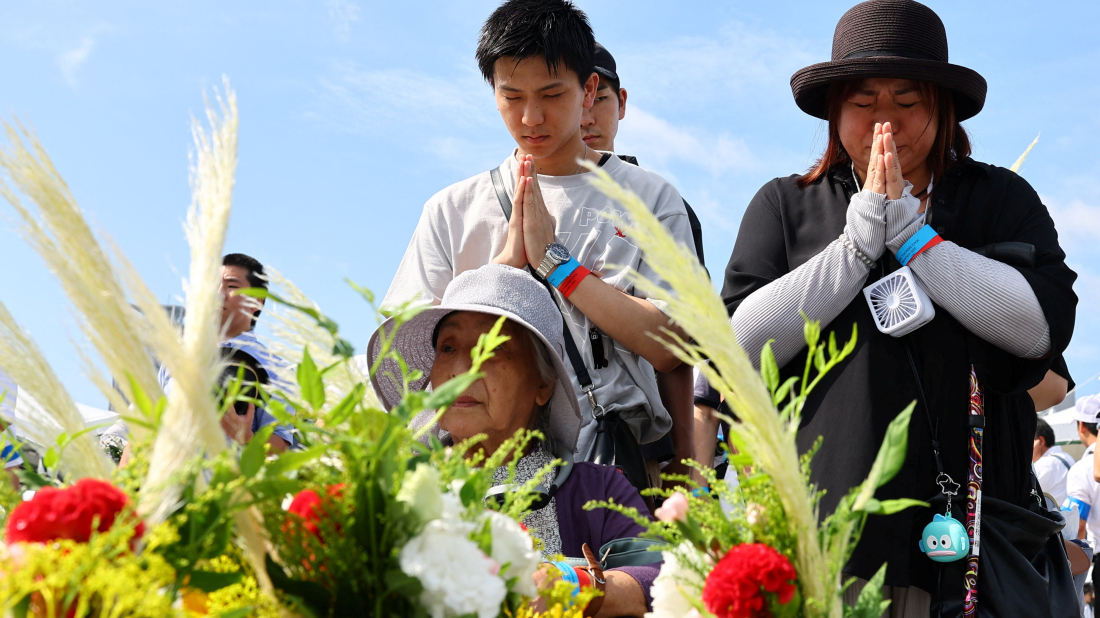live Iran and Israel escalate military action following Iran’s Supreme Leader Ali Khamenei’s death
Follow the latest developments and global reaction after the U.S. and Israel launched “major combat operations” in Iran, prompting reta...

Thousands gathered in Hiroshima on Wednesday to mark 80 years since the city was devastated by an atomic bomb, as the mayor warned of the growing threat of nuclear weapons and urged global leaders to reflect on the lessons of the past.
The annual ceremony, commemorating one of history’s deadliest wartime attacks, was attended by representatives from a record 120 countries and regions.
Hiroshima Mayor Kazumi Matsui addressed the gathering, warning of a growing global drift toward militarisation and renewed reliance on nuclear weapons.
"Among the world's political leaders, there is a growing belief that possessing nuclear weapons is unavoidable in order to protect their own countries," he said, noting that the U.S. and Russia possess 90% of the world's nuclear warheads.
"This situation not only nullifies the lessons the international community has learned from the tragic history of the past, but also seriously undermines the frameworks that have been built for peace-building.
"To all the leaders around the world, please visit Hiroshima and witness for yourselves the reality of the atomic bombing."
Yoshikazu Horie, a 71-year-old tourist, echoed the mayor’s concerns.
"It feels more and more like history is repeating itself. Terrible things are happening in Europe ... Even in Japan, in Asia, it's going the same way, it's very scary," he said.
"I've got grandchildren and I want peace so they can live their lives happily."
Survivors of the bombing, known as "hibakusha", have long faced social stigma over fears they carried diseases or passed on genetic damage. Their numbers dropped below 100,000 for the first time this year.
On 6 August 1945, the United States dropped a uranium bomb, nicknamed "Little Boy", on the western Japanese city, killing about 78,000 people instantly. The blast and resulting radiation claimed tens of thousands more lives by the end of the year - estimated to be around 140,000 by the end of that year.
Hiroshima had served as a military headquarters and supply base during World War Two. U.S. planners selected it partly because the surrounding mountains were expected to concentrate the bomb’s force and amplify its destructiveness.
"Little Boy" unleashed a heatwave reaching 4,000 degrees Celsius (7,200 Fahrenheit), followed three days later by a plutonium bomb dropped on Nagasaki killing around 70,000 people.
Japan surrendered on 15 August, bringing the war to an end.
The country, the only one to have experienced nuclear attacks, has declared its commitment to nuclear disarmament, though it is not a signatory or observer of the U.N. treaty to ban nuclear weapons.
Follow the latest developments and global reaction after the U.S. and Israel launched “major combat operations” in Iran, prompting retaliation from Tehran.
Tensions between the U.S. and Iran are escalating, with Washington ordering a significant military build-up in the region and multiple countries evacuating diplomatic staff amid fears of further instability.
Governments across the region responded swiftly to Israel’s strikes on Iran, closing airspace, issuing travel advisories and activating contingency plans amid fears of escalation.
Two people were killed and around 40 injured when a tram derailed in central Milan on Friday (27 February), a spokesperson for the local fire service said.
A senior Iranian official has warned Israel to “prepare for what is coming”, insisting that Tehran’s response to the latest escalation in the Middle East will be made openly and without limits.
Protests broke out in Pakistan and Iraq on Sunday after Iranian state media confirmed that Supreme Leader Ayatollah Ali Khamenei had been killed in joint U.S.–Israeli strikes. At least nine people were reported dead in clashes near the U.S. consulate in Karachi.
Afghanistan said it had fired at Pakistani aircraft over Kabul after explosions and gunfire rocked the capital early on Sunday, marking a sharp escalation in fighting between the two neighbours.
A senior Iranian official has warned Israel to “prepare for what is coming”, insisting that Tehran’s response to the latest escalation in the Middle East will be made openly and without limits.
Cuba has released extensive details of a deadly midweek shootout at sea, showing rifles, pistols and nearly 13,000 rounds of ammunition that it says were carried by a group of exiles who attempted to enter the island by speedboat.
Afghanistan’s Taliban rulers said on Friday (27 February) they were ready to negotiate after Pakistan bombed their forces in several Afghan cities, including Kabul and Kandahar, and Islamabad declared the neighbours were now in "open war".
You can download the AnewZ application from Play Store and the App Store.

What is your opinion on this topic?
Leave the first comment